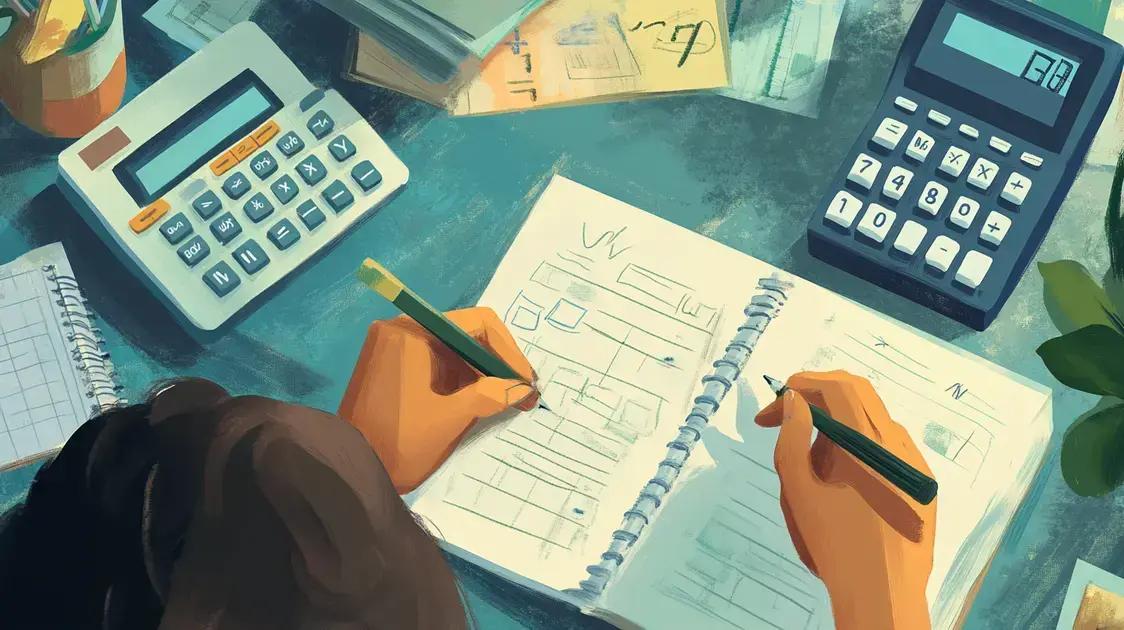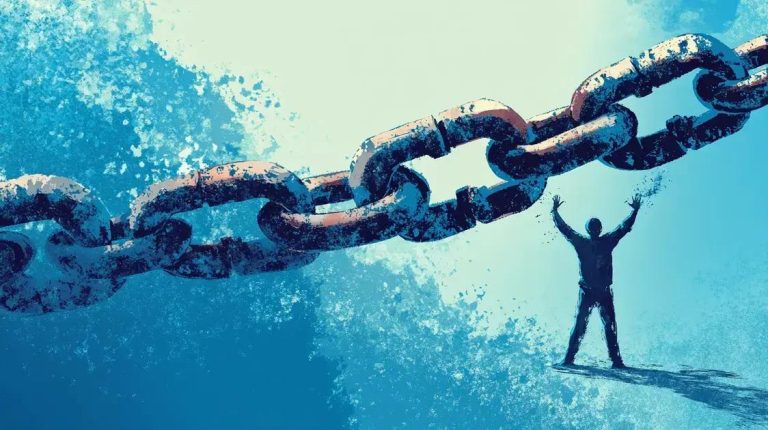Anúncios
To get out of debt effectively, it’s important to create a structured repayment plan and stick to a budget with financial discipline.
You can also use tools like financial counseling and budgeting apps, while cutting unnecessary expenses and making extra payments to accelerate the process.
Are you struggling and asking yourself, how to get out of debt? You are not alone. Millions of people face financial challenges, but it is possible to regain your financial freedom.
Anúncios
Understanding Debt: The Basics
Debt refers to the amount of money that an individual or organization owes to another party. It typically arises when one party borrows money and promises to pay it back later.
Understanding the fundamental concepts of debt is crucial in learning how to get out of debt effectively.
Types of Debt
There are various types of debt, such as secured debt and unsecured debt. Secured debt is backed by collateral, like a house or car.
If the borrower fails to repay, the lender can seize the collateral.
Anúncios
On the other hand, unsecured debt does not have collateral, including credit card debt and personal loans. This type often carries higher interest rates.
How Debt Accumulates
Debt can accumulate due to various reasons. Common issues include overspending, unexpected expenses, and not having a clear budget.
It’s critical to understand how these factors can lead to financial difficulties.
Impact of Debt
Debt can significantly impact life, from stress and anxiety to limiting personal finances. High levels of debt can affect relationships and overall well-being.
Recognizing the seriousness of debt is the first step in finding ways to manage it.
The Debt Cycle
Many people experience the debt cycle, where they borrow more to pay off existing debt, leading to a never-ending cycle.
Breaking this cycle requires a solid understanding of your finances and early intervention strategies.
Understanding Interest Rates
Interest rates play a significant role in debt’s growth. High-interest rates mean you pay more over time.
Understanding how interest rates work is essential for managing debt efficiently.
Debt Awareness
The first step in tackling debt is awareness. Knowing how much you owe, to whom, and the interest rates can help in developing a clear debt repayment strategy.
Keeping track of your debts creates a clearer picture to work from.
Common Causes of Debt
Debt often stems from various common causes that can affect anyone. Understanding these triggers can be essential in learning how to get out of debt.
Here are some of the main reasons people find themselves in debt:
1. Overspending
One of the most significant contributors to debt is overspending. This occurs when individuals buy more than they can afford, often due to impulse purchases or lifestyle inflation.
As expenses rise, it becomes challenging to keep up with payments.
2. Lack of Budgeting
A lack of proper budgeting can lead to financial disorganization.
Without tracking income and expenses, people might not realize how much they are spending, causing them to go into debt.
3. Medical Expenses
Unexpected medical bills can quickly accumulate and lead to significant debt. Many people find it challenging to pay for healthcare out of pocket, especially during emergencies or prolonged medical treatment.
4. Loss of Employment
A sudden loss of employment can create financial strain, making it difficult to pay rent, bills, and other expenses.
This often forces individuals to rely on credit cards or loans to make ends meet.
5. Student Loans
While education is essential, student loans can also be a significant source of debt for many graduates.
High-interest rates and large balances can make repayment daunting, leading to further financial challenges.
6. Relationship Issues
Relationship problems, such as divorce or separation, can lead to increased expenses and financial instability, often resulting in debt accumulation.
7. Lifestyle Choices
Some individuals may maintain a lifestyle that exceeds their income, often influenced by peer pressure or the desire for status.
This lifestyle can lead to borrowing and eventually spiraling into debt.
By recognizing these common causes of debt, individuals can better understand their financial situations and take necessary actions towards regaining control.
The Importance of a Budget

Creating a budget is an essential step in managing your finances effectively.
It acts as a financial roadmap, guiding you toward your financial goals and helping you to understand how to get out of debt. Here’s why a budget is important:
1. Awareness of Spending
A budget helps you become more aware of your spending habits.
By tracking where your money goes each month, you can identify areas where you may be overspending and take action to reduce those expenses.
2. Control Over Finances
When you establish a budget, you gain control over your finances.
It empowers you to make informed decisions about how you allocate your resources and helps prevent impulsive spending.
3. Setting Financial Goals
A budget allows you to set and prioritize your financial goals.
Whether it’s saving for a vacation, a new car, or paying off debt, having a budget will enable you to allocate funds toward your goals each month.
4. Reducing Financial Stress
Managing money can be stressful, but having a budget can alleviate some of that stress.
Knowing exactly how much money you have and where it is going can provide peace of mind and help you feel more secure.
5. Better Decision-Making
With a budget, you have a clearer picture of your financial situation. This awareness leads to better decision-making.
You can think twice before making large purchases and understand how those choices fit into your overall financial plan.
6. Progress Tracking
A budget allows you to track your progress over time.
You can see how your efforts are helping you pay off debt, increase savings, or reach other financial milestones, giving you motivation to stick to your plan.
7. Preparing for the Unexpected
Having a budget also prepares you for unexpected expenses.
By including a category for emergencies or unplanned costs, you can avoid derailing your financial plans when surprises arise.
Overall, budgeting is a vital tool that can lead you towards financial stability and help you stay on track in your journey to regain financial freedom.
Strategies to Pay Off Debt
Paying off debt can feel overwhelming, but with the right strategies, you can make steady progress.
Here are some effective methods to help you tackle debt efficiently:
1. Make a Debt Repayment Plan
Start by listing all your debts, including amounts, interest rates, and due dates.
Create a repayment plan that prioritizes either the smallest debts (the debt snowball method) or the highest interest debts (the debt avalanche method).
2. Cut Unnecessary Expenses
Review your monthly budget and identify areas where you can cut back.
Reduce non-essential expenses like dining out, subscriptions, and impulse purchases. Use these savings to put more money toward paying off debt.
3. Use Extra Income Wisely
If you receive extra income, like a bonus or tax refund, use it to pay down debt.
Consider taking on a part-time job or side gig to generate additional income for debt repayment.
4. Negotiate Lower Interest Rates
Contact your credit card companies and request a lower interest rate.
Explain your situation; sometimes, they may offer to reduce your rate to keep you as a customer. Lower rates mean less interest paid overall.
5. Consider Debt Consolidation
Debt consolidation can simplify your payments by combining multiple debts into one loan with a lower interest rate.
This can make payments more manageable and help you pay off debt faster.
6. Automate Payments
Set up automatic payments for your debts to ensure you never miss a payment. This can prevent late fees and keep you on track with your repayment plan.
7. Seek Professional Help
If your debt feels unmanageable, consider consulting a credit counselor or financial advisor.
They can provide personalized guidance, help you create a budget, and suggest additional strategies tailored to your situation.
By implementing these strategies, you can create a clearer path to financial freedom and take control of your debt.
Creating a Debt Repayment Plan
Creating a debt repayment plan is essential for regaining control over your finances.
A well-structured plan can help you pay off your debts systematically and efficiently. Here’s how to create a successful debt repayment plan:
1. List All Debts
Begin by listing all your debts, including the creditor’s name, total amount owed, interest rate, and minimum monthly payment.
This will give you a clear overview of your financial situation.
2. Choose a Repayment Strategy
Decide on a strategy that fits your financial situation. You can use the debt snowball method, which prioritizes paying off the smallest debts first to build motivation.
Alternatively, the debt avalanche method targets high-interest debts first, helping you save more on interest in the long run.
3. Set a Budget
Integrate your debt repayment plan into your budget. Allocate a specific amount each month toward debt repayment.
Ensure you stick to your budget by carefully tracking your expenses and cutting unnecessary costs.
4. Make Extra Payments
If possible, commit to making extra payments on your debts.
Any additional funds you can apply will reduce your principal balance, helping you pay off the debt faster.
5. Stay Organized
Keep all your debt-related documents organized.
Use spreadsheets or apps to track payment due dates and amounts, ensuring you never miss a payment and avoid late fees.
6. Monitor Your Progress
Regularly review your repayment plan to track your progress. Celebrate small victories as you pay off individual debts.
This can motivate you to keep moving forward.
7. Adjust as Needed
Your financial situation may change over time. Be flexible and willing to adjust your repayment plan if needed.
If you face new financial challenges, reassess your budget and repayment strategy to stay on track.
Effective planning and disciplined execution will help you achieve your goal of becoming debt-free.
Maintaining Financial Discipline

Maintaining financial discipline is crucial in your journey to get out of debt. It requires commitment and consistent effort.
Here are some effective tips to help you stay disciplined with your finances:
1. Stick to Your Budget
Following your budget is the foundation of financial discipline.
Make sure to regularly review your budget and adjust it as necessary to meet changing circumstances, but strive to stick to it as closely as possible.
2. Set Clear Goals
Setting clear and achievable financial goals can help you maintain focus.
Break larger goals into smaller, manageable tasks, and celebrate your progress as you accomplish each step.
3. Keep Track of Your Spending
Monitor your expenses regularly. Use budgeting apps or spreadsheets to track where your money is going.
This awareness can help you identify areas for improvement and prevent overspending.
4. Avoid Temptations
Limit exposure to situations that may tempt you to overspend, such as frequent visits to malls or browsing online sales.
Instead, find productive activities that do not involve spending money.
5. Prioritize Needs Over Wants
Learn to differentiate between needs and wants.
Prioritizing essential expenses over non-essential items is crucial in maintaining financial discipline and sticking to your repayment plan.
6. Use Cash for Discretionary Spending
Consider using cash instead of credit cards for discretionary spending. This can help you keep better control over your spending and limit purchases to what you can afford.
7. Review Financial Progress Regularly
Set aside time each month to review your financial progress. Check your debt balances and see how well you are sticking to your plan. Make any necessary adjustments to stay on track.
8. Seek Support
Share your financial goals with trusted friends or family members.
Having a support system can help you stay accountable and motivated throughout your debt repayment journey.
By implementing these strategies, you can foster a mindset of financial discipline that will aid you in achieving your financial goals and getting out of debt.
Resources for Debt Management
Having access to the right resources can significantly aid in managing debt effectively. Here are some valuable resources to consider for debt management:
1. Financial Counseling Services
Many non-profit organizations offer free or low-cost financial counseling services.
These counselors can help assess your financial situation, create a budget, and develop a debt repayment plan tailored to your needs.
2. Debt Management Apps
Numerous apps are available to help you track your spending, set budgets, and monitor your debt repayment progress.
Popular options include Mint, You Need A Budget (YNAB), and PocketGuard, all designed to help you stay on top of your finances.
3. Online Financial Education Resources
Websites like the National Endowment for Financial Education (NEFE) and Smart About Money provide extensive resources on personal finance.
They offer articles, courses, and tools designed to help you manage and reduce debt effectively.
4. Community Support Groups
Joining a support group can provide you with encouragement and motivation.
Look for local or online groups that focus on financial wellness, where members share their experiences and strategies for managing debt.
5. Books and Publications
Many authors provide valuable insights on debt management through books and eBooks.
Titles like “The Total Money Makeover” by Dave Ramsey and “Your Money or Your Life” by Vicki Robin can offer practical strategies and motivation for financial change.
6. Credit Reports and Scores
Regularly reviewing your credit report can help you understand your financial situation better.
Websites like AnnualCreditReport.com allow you to access your credit reports for free, helping you identify errors and monitor your progress.
7. Legal Assistance for Debt Issues
If you’re facing legal issues due to debt, seeking help from legal aid organizations can provide the necessary support.
They can help you understand your rights and options regarding bankruptcy or collections.
Utilizing these resources can empower you to take control of your financial situation and work towards achieving a debt-free life.
FAQ – Frequently Asked Questions about Getting Out of Debt
What is a debt repayment plan?
A debt repayment plan is a strategy that outlines how you will pay off your debts over a specific period of time.
It includes details like the amount owed, interest rates, and monthly payments.
What are effective strategies to pay off debt?
Effective strategies include creating a debt repayment plan, cutting unnecessary expenses, making extra payments, and consolidating debts to lower interest rates.
How can I maintain financial discipline?
To maintain financial discipline, stick to your budget, set clear financial goals, track your spending, and avoid temptations that lead to overspending.
What resources are available for debt management?
Resources for debt management include financial counseling services, budgeting apps, online educational resources, support groups, and legal assistance for debt issues.
How do I effectively create a budget?
Creating an effective budget starts with tracking your income and expenses.
It also involves setting spending limits for different categories and reviewing the budget regularly to make necessary adjustments.
What steps can I take if I am overwhelmed by debt?
If overwhelmed by debt, consider reaching out to a financial advisor, exploring credit counseling services, or considering a debt consolidation loan to make repayments more manageable.





